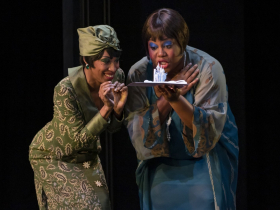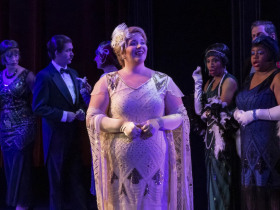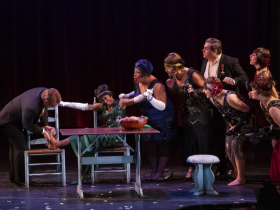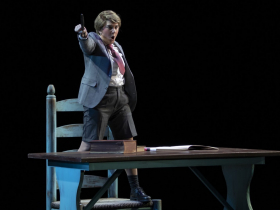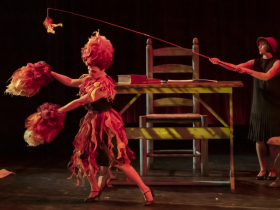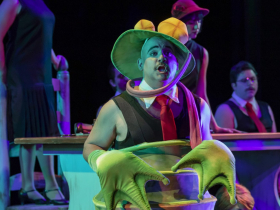Florentine’s Smaller Show Is Charming
Two early 20th century mini-operas, 'Cinderella,' and a Ravel work about a naughty child, are well performed.
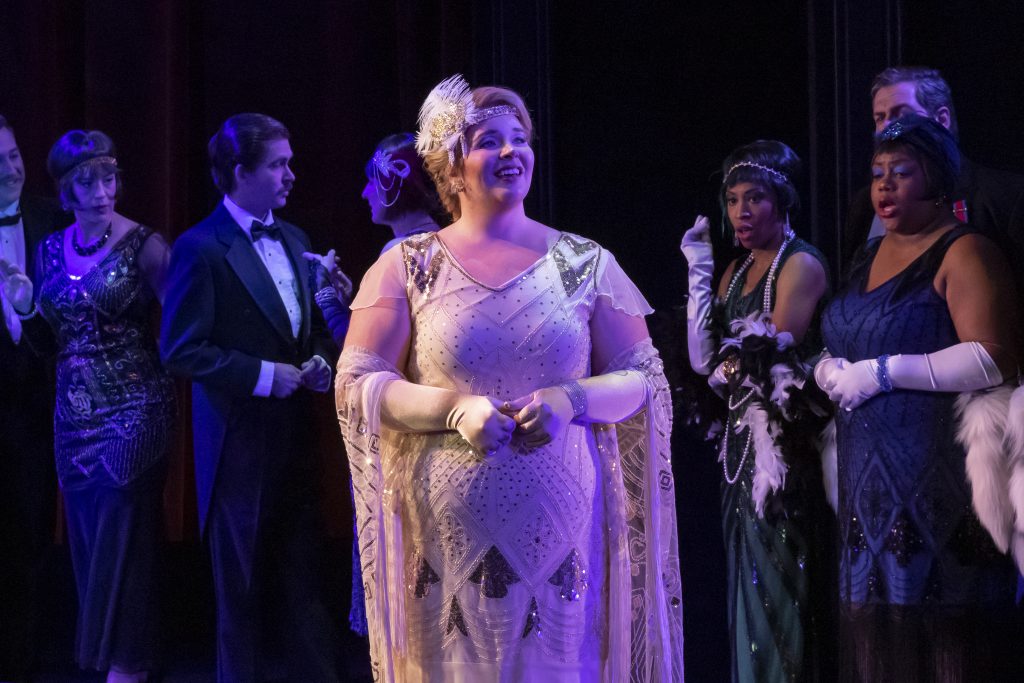
(Front) Kathryn Henry as Cinderella, (Back Row) The Florentine Opera Chorus and Taylor-Alexis DuPont as Armelinde Pictordu (step-sister), Zachary Crowle as Baron Pictordu (father) and Ardeen Pierre as Maguelonne Pictordu (step-sister). Photo by Traveling Lemur Productions.
Normally my reviews of the Florentine Opera Company function as an afterword about an opera readers can’t see. Costs being what they are for grand opera, the Florentine usually aims to fill the Marcus Performing Arts Center’s giant main hall, the Uihlein, for only two performances on one weekend, Friday night and Sunday afternoon.
Not this time, one of those rare occasions when the Florentine uses its talented Baumgartner seasonal interns (most with a master’s degree in music), unheralded guest artists, its own chorus and a local school’s children’s chorus for a two weekend presentation of a little known works in the PAC’s smaller more intimate Wilson Theater (also known as Vogel Hall). Curiously enough the house wasn’t packed and tickets for some fine opera are still available for next weekend, March 18 and March 20.
The dual bill showcases some neglected women in the arts – the most notable one, French 19th century composer, pianist and singer Pauline Viardot whose salons and lovers were famous but whose prolific output has suffered as have many women composers because their personality and friendships disguised their classical individuality (something far deeper than versatility).
She wrote the event’s Cinderella when in her eighties as the century turned, following the famous fable but making it more a commentary on social attitudes – Cinderella’s stepsisters are more vain social climbers than evil, their baron father tries to hide his grocer roots, Prince Charming is actually the one in disguise and Cinderella is unfailingly sweet to her enemies.
Viardot seems drawn back to the simpler elongated compositional lines we associate with French folk songs, providing some superb unabashed duets between Prince Charming (strong tenor Carlos Santelli) and the smiling soprano of Kathryn Henry as Cinderella. The comic fairy godmother Juliet Petrus gets some captivating singing in when not cutting out the paper dolls that in our imagination transform into carriage horses and footmen.
Her visions are at least half filled in the second half, with a story by Collette (of Gigi fame and also sadly neglected) and haunting musical flourishes by the prolific Maurice Ravel, known as The Child and The Enchantments. Basically, the child is having a horrible fit, misbehaving, throwing pottery, slashing books and stabbing pets until all the objects arise as enchantments in frightening costumes (courtesy of Brandon Kirkham) to chastise him and change his behavior.
Mollicone plus two other keyboardists, a cellist and a flute provide precise musical support for a fortress of singers and children, the cellist and flute concocting Ravel’s smorgasbord of effects to flood the mind and the stage with insects, birds, flowers and pets insulted by the child, who is sung and mimed well by soprano Annie Rosen.
But there is a dramatic imbalance here – little time in the music for the child to misbehave and lavish moments for the teapot, the trees, the clock, the insects and the garden to wax poetic in words and melody about the injuries suffered from the child. Ravel’s music is winning, but director Ponasik has to overwork the insects and gardens because there is not more time for the misbehavior from the child.
Along the way, however, we are reminded how much musicality, productive freedom and inventive interplay these smaller musical events can give to opera. Doesn’t have to be grand to be good.
Photo Gallery
Dominique Paul Noth served for decades as film and drama critic, later senior editor for features at the Milwaukee Journal. You’ll find his blog here and here.
Review
-
Ouzo Café Is Classic Greek Fare
 May 23rd, 2024 by Cari Taylor-Carlson
May 23rd, 2024 by Cari Taylor-Carlson
-
‘The Treasurer’ a Darkly Funny Family Play
 Apr 29th, 2024 by Dominique Paul Noth
Apr 29th, 2024 by Dominique Paul Noth
-
Anmol Is All About the Spices
 Apr 28th, 2024 by Cari Taylor-Carlson
Apr 28th, 2024 by Cari Taylor-Carlson

